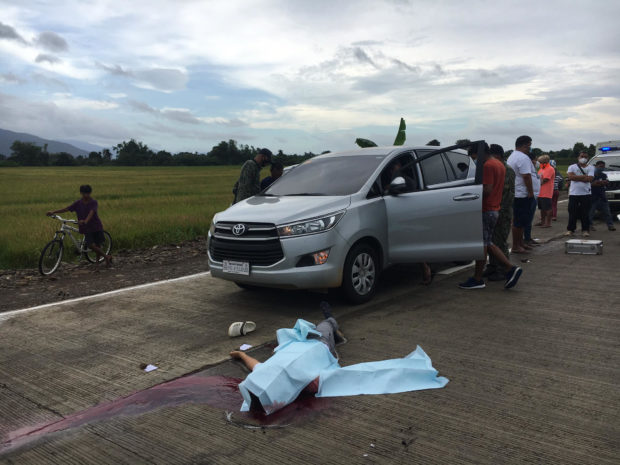
SLAIN LAWYER The body of lawyer Eric Jay Magcamit, 36, lies outside his car after he was gunned down in Narra, Palawan, on Nov. 17, 2020. Magcamit, who handled civil, criminal and election cases, among others, was reportedly the 52nd member of the bar killed during the Duterte administration. —CONTRIBUTED PHOTO
A Filipino lawyers’ group has asked the United Nations Human Rights Council (UNHRC) to hold the government accountable for the continuing attacks against lawyers, prosecutors and judges in the Philippines.
The complaint filed on Wednesday by the National Union of Peoples’ Lawyers (NUPL) in Geneva, Switzerland, comes ahead of next week’s Universal Periodic Review (UPR) of the country’s human rights record by the UNHRC.
NUPL said 59 out of the 133 lawyers, judges and prosecutors who had been killed since 1984 were attacked during former President Rodrigo Duterte’s administration.
But the group lamented that the harassment of lawyers and judges “has gone unabated” after President Marcos succeeded Duterte.
“[We] urge UN Human Rights Council member states to compel the Marcos government to stop committing human rights violations against Filipino human rights defenders,” NUPL secretary general Josalee Deinla said in a statement.
‘Urban operatives’
The NUPL noted that recently, its members were Red-tagged along with Judge Marlo Magdoza-Malagar, a Manila trial court judge who dismissed the government’s petition to proscribe the Communist Party of the Philippines and the New Peoples’ Army.
“The NUPL lawyers were falsely branded as ‘urban operatives’ of the underground movement while the NUPL itself has been profiled as a ‘communist terrorist group,’” NUPL said.
It said about 61 percent of the attacks on lawyers appeared to be linked to human rights and public interest cases, and services to human rights defenders and civil society groups.
Five of those who were killed were NUPL members who represented indigenous peoples, farmers, workers, environment activists, political prisoners and human rights defenders.
One of them was Juan Macababbad, the regional vice chair of the group’s affiliate, Union of Peoples’ Lawyers in Mindanao, who was gunned down outside his house in Surallah, South Cotabato, on Sept. 15, 2021, several days after he received death threats.
Counsel for ‘lumad’
According to human rights group Karapatan, Macababbad joined several fact-finding missions on the massacre of indigenous peoples in Lake Sebu in 2018, served as legal counsel for the “lumad” and opposed coal mining in the Daguma mountain range, which straddles the provinces of South Cotabato, Sultan Kudarat and part of Maguindanao.
“These attacks on officers of the court have to stop once and for all,” Deinla said. “If lawyers are hampered from freely and independently exercising their profession and if judges are threatened for their judicial decisions, access to justice and judicial independence will suffer.”
The lawyers’ group also called on the Marcos government “to conduct transparent, independent and impartial investigations” of the killings and to ensure that those responsible, especially state agents, will be brought to justice.
The NUPL added that the UNHRC must ask the Philippine government to “fulfill its obligations as a duty bearer under international and domestic human rights laws.”
Remulla back in Geneva
Justice Secretary Jesus Crispin Remulla will again lead the high-level government delegation to the 4th Cycle of the UPR, a peer-review mechanism of the UNHRC on Nov. 14.
In Geneva, Remulla said he would deliver a “very clear message” that the Philippines under Mr. Marcos would work to “deliver transformational reform of its justice and law enforcement sectors—to enhance the enjoyment of human rights of all our citizens—based on the rule of law and respect for due process.”
He would discuss the “comprehensive reform program of ‘Real Justice in Real Time’” of the Department of Justice, which includes decongesting prisons, improving case buildup through cooperation between prosecutors, investigators, and the Commission on Human Rights (CHR), and strengthening witness protection.
Previous reviews of the Philippines’ human rights record were conducted in 2008, 2012 and 2017.
“In the UPR, each country is free to respond to issues in the manner it deems most appropriate. There is no obligation to accept all recommendations. In any case, the Philippines will engage constructively and openly based on the principles of sovereign equality, independence and dialogue,” Remulla said.
Part of democracy
Last month, Remulla also met with the UN in Switzerland where he pushed back against criticisms of Red-tagging, or accusing a person or a group of being a communist or a rebel sympathizer. He said it wasn’t a threat but part of democracy.
The UNHRC had recommended that the Philippines replace its “extremely punitive approach” to its campaign against illegal drugs, which killed thousands since it was launched by Duterte.
The committee also expressed its concern over the continued detention of former Sen. Leila de Lima and urged the government to cooperate with the investigation by the International Criminal Court. INQ
RELATED STORY:
SC warns vs inciting attacks against judges